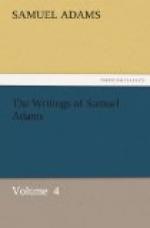much skill and ingenuity, as they now shape their
Arrows. Education leads youth to “the Study
of human nature, society, and universal History”
from whence they may “draw all the Principles”
of Political Architecture, which ought to be regarded.
All Men are “interested in the truth.”
Education by showing them “the End of all its
consequences” would induce, at least, the greatest
numbers to inlist on its side. The Man of good
understanding who has been well educated, and improves
these advantages as far as his circumstances will
allow, in promoting the happiness of Mankind, in my
opinion, and I am inclined to think in yours is indeed
“well born.” It may be “puerile,
and unworthy of Statesmen” to declame against
Family Pride; but there is and always has been such
a ridiculous kind of Vanity among Men. “Statesmen
know the evil, and danger is too serious to be sported
with.” I am content they should be put
into one hole; as you propose, but I have some fears
that your Watchmen on each side will not well agree.
When a Man can recollect the Virtues of his Ancestors;
he certainly has abundantly more solid satisfaction
than another who boasts that he sprang from those,
who were rich, or noble; but never discovers the least
degree of Virtue, or true worth of any kind.
“Family Popularity,” if I mistake not,
has its source in family pride; It is by all means
sought after that hommage may be paid to the name
of the Title or Estate, to supply the want, in the
possessor, of any great, or good quality whatsoever.
There are individuals among Men, who study the art
of making themselves popular, for the purpose of getting
into Places of Honour, and Emoluments, and by these
means of gratifying hereafter the noble Passion—Family
Pride. Others are so inchanted with the Musick
of the sound, that they conceive it to be supreme
felicity. This is indeed Vanity of Vanities,
and if such deluded Men ever come to their Senses,
they will find it to be vexation of Spirit. When
they reflect on their own folly, and injustice in
having received the breath of Applause with avidity,
and great delight, for Merrit which they are conscious
they never had; and that many who have been the loudest
in sounding their praises, had nothing in view, but
their own private, and selfish interests, it will
excite in them the feelings of shame, remorse, and
self contempt.
The truly virtuous Man, and real Patriot, is satisfied with the approbation of the wise, and discerning; he rejoices in the contemplation of the Purity of his Intentions, and waits in humble hope for the Plaudit of his final Judge.
I shall hardly venture again to trespass on the Benevolence of our Confidential Friend—you will not be sorry; it will afford you Reliefe, for in common Civility you must be at the Trouble of reading ones Epistles. I hope there will be a Time when we shall have “sweet Communion” together. In the mean Time let me not lose the Benefit of your valueable Letters. Adieu. Believe me




